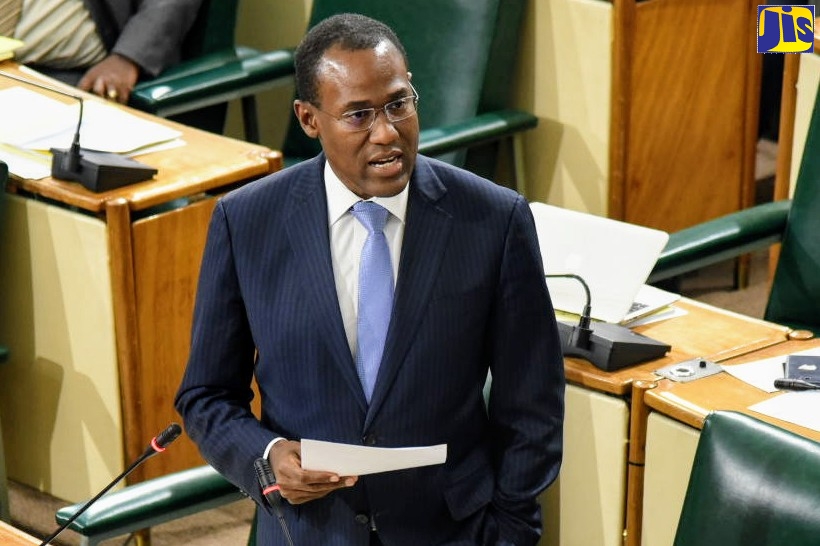Revenue Up For April To July
By: , October 9, 2019The Key Point:
The Facts
- This is two per cent higher than budgeted and 8.9 per cent more than the corresponding period last year, according to the 2019/20 Fiscal Policy Paper Interim Report for September 2019, which was tabled in the House of Representatives by Finance and the Public Service Minister, Dr. the Hon. Nigel Clarke.
- The better than budgeted out-turn has been attributed to tax revenue inflows of $179.8 billion, and non-tax revenue totalling 19.4 billion, which were 2.1 per cent and 3.1 per cent higher than their respective targets, the document outlines.
The Full Story
For the first four months of fiscal year 2019/20 (April to July), Government revenue and grant inflows totalled just over $202 billion.
This is two per cent higher than budgeted and 8.9 per cent more than the corresponding period last year, according to the 2019/20 Fiscal Policy Paper Interim Report for September 2019, which was tabled in the House of Representatives by Finance and the Public Service Minister, Dr. the Hon. Nigel Clarke.
The better than budgeted out-turn has been attributed to tax revenue inflows of $179.8 billion, and non-tax revenue totalling 19.4 billion, which were 2.1 per cent and 3.1 per cent higher than their respective targets, the document outlines.
These out-turns are also 6.8 per cent and 30.1 per cent higher than the corresponding period in 2018/19. However, capital revenue and grants recorded lower than anticipated inflows.
The Policy Paper notes that for the fifth consecutive year, first-quarter tax revenue inflows outpaced the budgeted target.
This year’s out-turn is attributed to increases in international trade taxes, up $2.7 billion, and revenue from production and consumption, up $1.98 billion.
Income and profit taxes, however, fell below target, due mainly to lower than the budgeted Pay As You Earn (PAYE) target of $21.1 billion, by $1.3 billion.
According to the Policy Paper, international trade tax collections totalled $73.3 billion, with all subcategories contributing to this buoyant performance, thereby resulting in the overall Budget being exceeded by $2.7 billion.
This mainly resulted from the higher Cost, Insurance and Freight (CIF) value of goods imported over the April to June period, slight depreciation of the Jamaican currency as well as continued improvement in overall efficiency,
Customs Duty, General Consumption Tax (imports), and the Environmental Levy all recorded higher than anticipated growth in the CIF value of imports, resulting in collections being $638.3 million, $431.6 million, and $75.6 million higher than their respective budgets.
The Policy Paper also indicates that for stamp duty collections, receipts with CIF values below and above $5,500 grew above expectations, resulting in collections of $971.8 million, which was $204.4 million higher than budgeted, and $137 million greater than the corresponding period in 2018/19.
Special Consumption Tax (SCT) imports recorded the highest nominal increase over the budgeted $921 million, resulting in collections totalling $17.48 billion.
This was attributed to higher than anticipated inflows from petroleum products, specifically crude oil imports for the Petrojam refinery.
Meanwhile, the Policy Paper notes that Travel Tax continues to perform well, relative to the budget, and is indicative of growth within tourism.
For April to June 2019, foreign national arrivals, at 7.8 per cent, were higher than projected, while non-resident Jamaican arrivals also grew by 19.1 per cent.
Despite cruise passenger arrivals declining during the period, according to the Paper, this did not constrain the overall travel tax out-turn.
Production and consumption taxes were deemed to have performed well, relative to budget.
Collections totalled $65.3 billion, which is $1.98 billion higher than budget, and $2.47 billion more than the corresponding period in 2018/19.
The main drivers, according to the Fiscal Policy Paper, were: General Consumption Tax (local), which recorded collections totalling $36.6 billion, some $691.6 million above budget; $276.2 million in contributions from Betting,
Gaming and Lotteries, which recorded collections of $2.05 billion, which was 15.5 per cent higher than budget; and taxes from other licences, which had inflows totalling $751.6 million or was 68.2 per cent above budget, and 104.1 per cent higher than 2018/19.
First-quarter fiscal year non-tax revenue inflows totalled $19.4 billion, to be broadly in line with the budgeted $18.8 billion.
The primary contributors were demarked funds amounting to $4.58 billion; custom administration fees, $1.19 billion; programmed National Housing Trust (NHT) transfers, $2.85 billion; and royalties, $271 million.
However, capital revenue and grant collections fell below their budgets by $233.6 million and $157.6 million, respectively.
The Policy Paper indicates that lower grant proceeds resulted from slower than budgeted implementation of grant-related projects.




